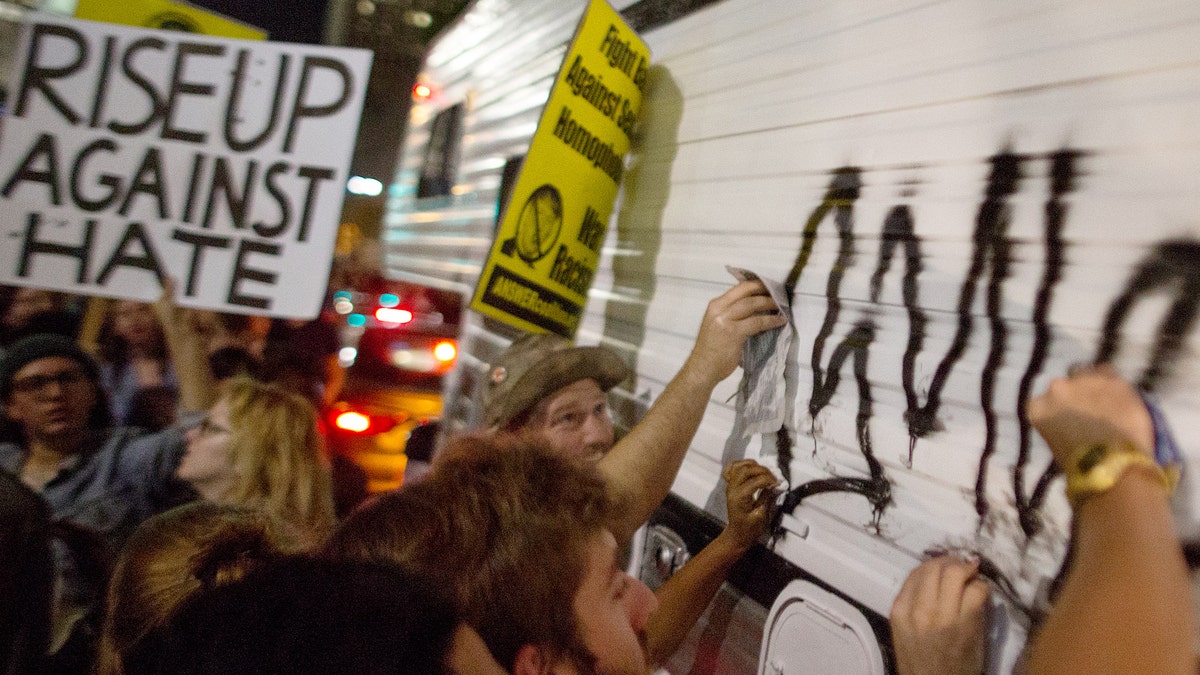
Protesters clean graffiti from a vandalized vehicle on November 9 2016 in Los Angeles, California, United States. (2016 Getty Images)
Within hours of Donald Trump’s election to the presidency, waves of anti-immigrant and racist incidents have been reported across the country.
And they have kept coming on an almost daily basis in several major cities. The question is, Is this the new normal?
Many experts say the incidents will probably dwindle and stop, as they have in elections in the recent past – both in the U.S. and around the world.
"I don’t think there's any question – there's been a very real spike in hate crimes. We saw a similar spike after [Barack] Obama was elected. It lasted about two weeks," Mark Potok, senior fellow at the Southern Poverty Law Center (SPLC), told Fox News Latino.
Potok also mentioned the case of the "Brexit" vote, the United Kingdom's effort to withdraw from the European Union which was surprisingly approved in a referendum earlier this year.
"In the U.K., there was a major spate of hate crimes that lasted for a couple of weeks, and then it calmed down. And I would hope that this too will calm down," he said.
According to the SPLC, just in the first seven days after the election, they received 435 reports of incidents involving harassment and intimidation — ranging from anti-black to anti-woman to anti-LGBT.
The center also indicated there has been a notable rise in hate groups — defined by the SPLC as those that vilify entire groups of people based on immutable characteristics such as race or ethnicity — in the last few years: from 149 in 2008 to 1,360 groups today.
Daria Roithmayr, a professor at the Gould School of Law at University Southern California, said the election of Trump could exacerbate the rise of hate incidents, since he has “tapped into a toxic combination of economic anxiety and racism.”
“There’s this perception that immigrants are butting in line unfairly. If you’re adrift and you see groups getting a life preserver, you’re going to be hugely resentful. This anger has been growing and the election has given voice to what they’ve been feeling all along,” Roithmayr told FNL.
Roithmayr noted that this outpouring of anger is out in the open and setting a precedent.
“The kids are watching their parents feeling free to say what they’re feeling,” Roithmayr said.
“The demons have been set lose," said Potok on his part.
Oren Segal, director of the Anti-Defamation League office that monitors extremism, told the Associated Press that young people "were watching and observing this presidential campaign as closely as anyone else." Now that the campaign is over, "the impact of what they have seen is not just going to go away."
Moses Karngbaye, a student at Minnesota’s Maple Grove Senior High told CNN affiliate WCCO he was terrified to see racist graffiti sprawled inside a bathroom.
“Someone wrote, #Go back to Africa” and “Make America great again,” on a toilet paper dispenser at his school.
“That’s the first time I honestly felt like crying at school,” Karngbaye told WCCO.
The bathroom door was also covered with graffiti, including “Whites only,” “White America” and “Trump.”
In Gurnee, Illinois, last week minority students at a high school organized a meeting and a protest following a “Whites only” message was discovered scrawled on a bathroom door. The same day students in Michigan at Royal Oak Middle school were filmed in the cafeteria chanting “Build a wall!”
Moving forward, Roithmayr worries that as American minorities become the majority, this feeling of resentment could potentially be very volatile.
“You’re going to get a lot of resistance,” she warned.
Roithmayr said she believes the Republicans who're supporting Trump need to pressure him to temper his rhetoric. “We need to create the norm again that you can’t do these things,” she said. “Racial resentment is mobile — it’s there to be manipulated. It’s as if we’re back in 1968, and now the wolf doesn’t need to be in sheep’s clothing.”
The Associated Press contributed to this report.
